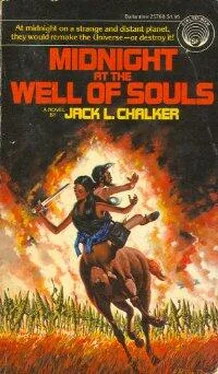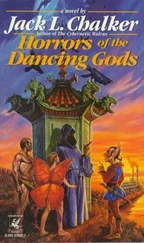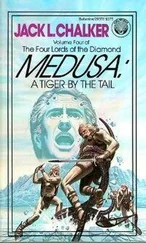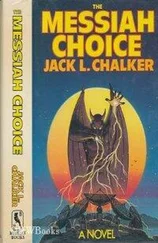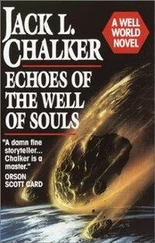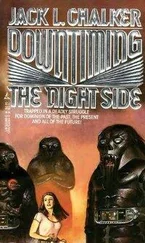Ortega woke them all up the next morning. They assumed it was morning, although they hadn’t actually been outside and, in fact, had no idea what the outside looked like on this strange yet somehow familiar world. An old-style breakfast of what appeared to be normal hen’s eggs, scrambled, sausage, toast, and coffee awaited them, served by the same little cart that had brought the previous night’s supper. Brazil noted that the mess from flying food had been carefully cleaned away.
Vardia, of course, had trouble with the breakfast.
Wu Julee seemed no worse than the night before, and in no more pain, if, indeed, she was in pain at all. With a lot of coaxing from Brazil she managed to eat some of the breakfast.
After they had finished and had returned the trays to the little cart, which hummed away on small tires with no apparent guidance, Serge Ortega pressed another button on his little hidden console, causing a screen to drop down at his right.
“Time, unfortunately, is limited here—both for you and, because I have a great many other duties, for me as well. When I got dropped into Zone long ago, I had only a brief orientation before I was thrown out on my ass. I wanted to give you a little bit more, to make it a little easier on you than it was for me.”
“Just how long ago did you drop here, Citizen Ortega?” Vardia asked.
“Well, hard to say. Well over seventy standard years—they still use the same years, don’t they, Nate?” Brazil nodded affirmatively, and Ortega continued.
“It was during a low-colonist period, and I was gunrunning to a placer strike on some asteroids out beyond Sirius. I dumped them fine, avoided all the cops, but ran into some damned conduit out in the middle of deep space, before I could go FTL or anything. I’m told that most—maybe a majority—of the gates are on planets, and maybe this was one, too, at one time. Maybe all those asteroids were once a Markovian planet that broke up for some reason.”
“How long has this place—this planet—been here, Serge?” Brazil asked.
“Nobody knows. Longer than people were people, Nate. A coupl’a million years, it appears. Since the oldest folk in the planet’s oldest race are only four hundred—and they’re at death’s door—the ancient history of the place is as shrouded in mystery and mythology as our own. You see, all this involves the Markovians—any of you know about them?”
“Nobody knows much,” Brazil replied. “Some sort of super race that ran its planets from brains beneath the surface and died out suddenly.”
“That’s about it,” Ortega acknowledged. “They flourished, scientists here think, between two and five million years ago. And they were galaxy-wide, Nate! Maybe even more. Hard to say, but we have a lot of folk dropping through whose knowledge of the universe doesn’t match anything we humans know. And that’s the weirdest thing—a hell of a lot of them are close to human.”
“In what way do you mean that, Serge?” Brazil asked. “Us-human or you-human?”
Ortega laughed. “Both. Humanoid would perhaps be a better term. Well, first let me show you what you’re in for, and I’ll add the rest as I go along.”
The snakeman dimmed the lights, and a map showing two hemispheres flicked on the screen. It looked like a standard planetary map, but the two circles were filled with hexagons from pole to pole.
“The Markovians,” Ortega began, “who were nutty over the number six, built this world. We don’t know why or how, but we do know what. Each of their worlds had at least one gate of the kind that transported you here. You are now at the South Polar Zone, which doesn’t show accurately here for obvious reasons. All carbon-based life comes here, and all of the hexes north of us to that thick equatorial line are carbon-based or could live in a carbon-based environment. The Mechs of Hex Three Sixty-seven, for example, aren’t carbon-based, but you could live in their hex.”
“So the North Polar Zone takes care of the biologically exotic, then?” Hain asked.
Ortega nodded. “Yes, there are the true aliens, beings with which we have literally nothing in common. Their hexes run down to the equator on the north hemisphere.”
“Is that black band at the equator just a map dividing line or is it something else?” Vardia asked curiously.
“No, that’s not just on the map,” Ortega told her, “and you were sharp to notice it. It is—well, the best I can describe it is that it’s a sheer wall, opaque and several kilometers high. You can’t really see it until you’re at it, outside the border of the last hex by a hair. You can’t get past it, and you can’t fly over it or anything. It’s just, well, there. We have some theories about it, of course, the best one being that it’s the exposed part of the Markovian brain that is, it seems, of the entire core of this planet. The old name for it seems to be the Well of Souls—so it probably is just that. There’s an old adage around here: ‘Until midnight at the Well of Souls,’ which you’ll probably hear. It’s just an old ritual saying now, although it may have had some real meaning in the distant past of prehistory. Hell, if that’s the Well of Souls, then it’s always midnight somewhere!”
“What do the hexagons represent?” Hain asked.
“Well, there are fifteen hundred and sixty of them on the planet,” Ortega replied. “Nobody knows the reason for that, either, but at least the figure only has one six in it. Each hex is identical in size—each one of the six sides is just a shade under three hundred fifty-five kilometers, and they’re a shade under six hundred fifteen kilometers across. Needless to say they didn’t use our form of measurements when they built the place, and we don’t know what system they had, but that’ll give you an idea in our terms.”
“But what’s in the hexes?” Brazil prodded.
“Well, you could call them nations with borders,” Ortega replied, “but that would be understating things. Each is a self-contained biosphere for a particular life form—and for associated lower life forms. They are all maintained by the Markovian brain, and each is also maintained at a given technological level. The social level is left to whatever the inhabitants can develop or want to have, so you have everything from monarchies to dictatorships to anarchies out there.”
“What do you mean technological level?” Brazil asked him. “Do you mean that there are places where there are machines and places where there are not?”
“Well, yes, that, of course,” Ortega affirmed. “But, well, you can only get to the level of technology your resources allow within the hex. Anything beyond it just won’t work, like Hain’s pistol yesterday.”
“It seems to me that you would have been populated to death here,” Brazil commented. “After all, I assume all creatures reproduce here—and then the Markovian brains keep shuttling people here as well.”
“That just doesn’t happen,” Ortega replied. “For one thing, as I said, people can die here—and do. Some hexes have very cheap life, some species live a comparatively short time. Reproductive rates are in accordance with this death rate. If populations seem to be rising too high, and natural factors—like catastrophes, which can happen here, or wars, which also can happen, although they are not terribly common and usually localized—don’t reduce the numbers, well, most of the next batch is simply born sexually normal in every way yet sterile, with just a very small number able to keep the breed going. When attrition takes its toll, the species goes back to being born fertile. Actually the population’s pretty stable in each hex—from a low of about twenty thousand to a high of over a million.
Читать дальше
